In search of Vinicius Jr: Visiting the hometown of Real Madrid’s ‘shining star’
Stamfordblue 2023-05-27 21:45:52 评论
Nobody is paying much attention to the television in the corner of the bakery.
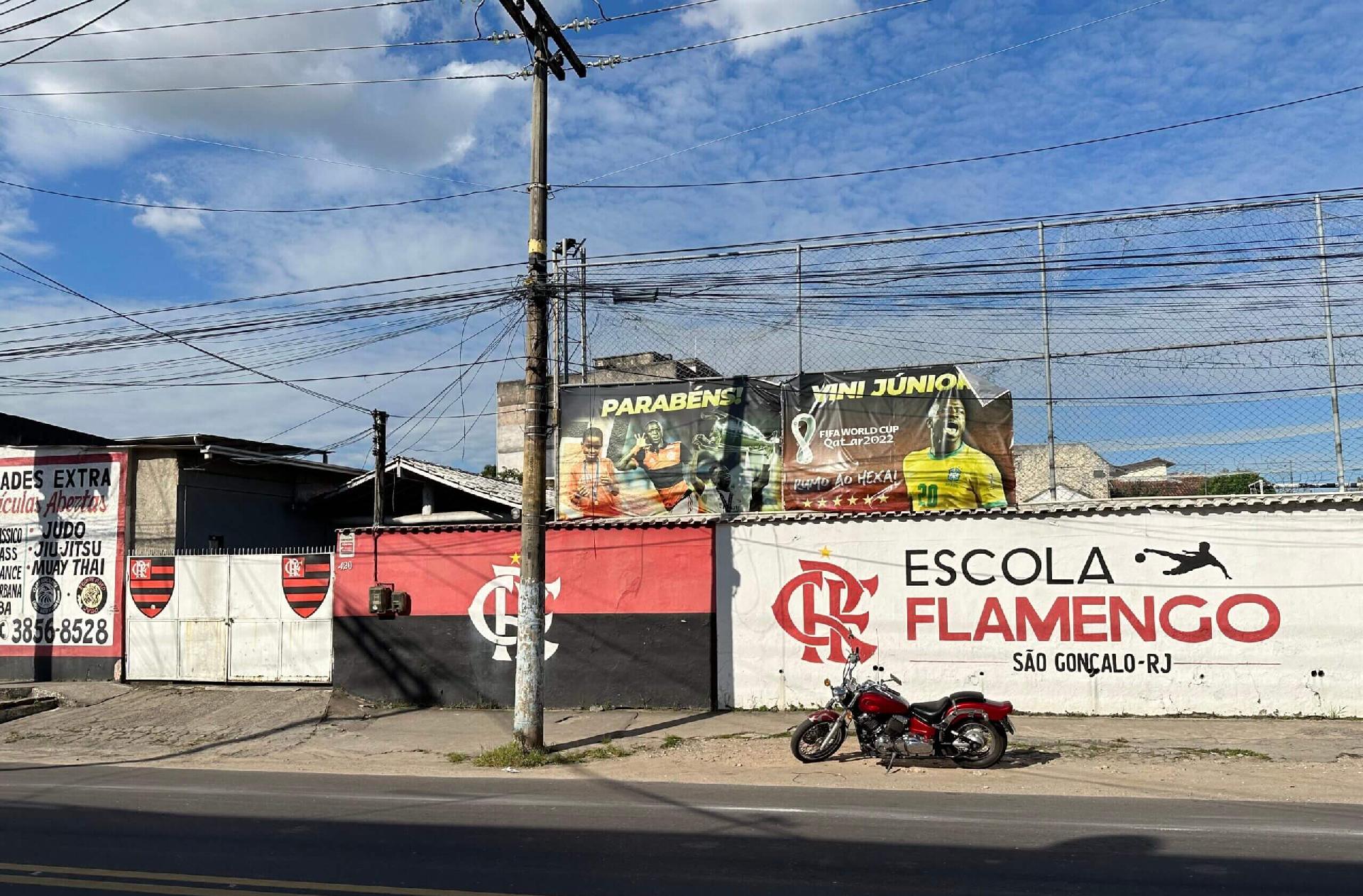
There is small talk, the clatter of washing-up. A man perches on a wooden seat next to the counter, sipping a coffee and gazing out at the passing traffic.
Then the sports bulletin comes on, showing a series of images that are by now grimly familiar: Vinicius Junior being put in a headlock; Vinicius Junior being sent off; Vinicius Junior being racially abused.
For 20 seconds, everyone stares at the screen. The silence is broken by the owner of the bakery, who turns away, shaking his head.
“They humiliated him,” he mutters. “A 22-year-old kid…”
Over the road, they are unlocking the gate to the local football pitch. Here, next to the usual catchphrases painted onto the walls (“Dedication, Love, Education”) are four giant fabric posters. They depict Vinicius Jr in happier times: winning the South American U17 Championship with Brazil; playing for Flamengo; lifting the Champions League trophy in a Real Madrid shirt.
“Thank you, Vinicius,” one reads. “Go and show them what you can do.”
This is where it all started for Vinicius Jr: the Escola Flamengo in Mutua. It is affiliated with Brazil's biggest professional team — there are around 120 other satellite schools around the country — but is a shoestring affair, with patchy artificial grass and tattered goal nets. It is run by a husband-and-wife team, more on love than money.
The same is true of the neighbourhood itself. Mutua is in Sao Goncalo, a sprawling municipality in the state of Rio de Janeiro, separated from the city of that name by the litter-strewn waters of Guanabara Bay. It is a proud, welcoming little slice of Brazil, but you could not call it prosperous.
Vinicius Jr grew up five minutes away, on Rua Heitor Rodrigues. He first came to train here aged six, staying until he joined the Flamengo academy proper four years later. The owner of the Escola, Carlos 'Cacau' Abrantes, is a small-time celebrity in these parts, credited with discovering a diamond. Vinicius Jr, it goes without saying, is Mutua's most famous son, the very definition of a local success story.
The Escola Flamengo in Mutua – where it all started for Vinicius Junior (Photo: Jack Lang/The Athletic)
Until now, that status has derived from his talent — luminous, scratchproof — and the sheer velocity of his joyride to the summit of his sport. Recent events, though, have added new texture, new symbolism. A fresh layer of pride, too, as becomes apparent later in conversations with those who know him well.
Vinicius Jr is suffering. He is also fighting.
Training is due to start at 3pm. Teenage boys shuffle through the gates in flip-flops. As they pull their boots on, The Athletic asks a couple of them what they think about the situation in Spain. “It's really sad,” one volunteers. “But Vinicius is an example to us all.”
Asked to sum up what Vinicius Jr means to a kid in Sao Goncalo, another of the boys takes a moment to think.
“In one word?” he asks. “Superacao.”
Overcoming.
Vinicius Jose Paixao — Vinicius Jr's father — worked in construction. His wife, Fernanda, looked after their four kids. Vinicius Jr has an older sister and two younger brothers.
The finances were sometimes precarious — Cacau and his wife helped out by finding second-hand football boots for Vinicius Jr — but family life was happy and supportive. Vinicius Sr and Fernanda accompanied their son to every training session, first in Mutua and later in nearby Niteroi, where he joined a futsal club called Canto do Rio.
“They used to sit quietly in the corner of the hall, watching him train,” says Joao Siqueira, who has worked at Canto do Rio as a kitman and caretaker for 34 years. “They were good people; it was a lovely family. They used to invite Patinho, his coach, over for barbecues. Money was tight, but God watched over them.”
Vinicius Jr had two sessions a week at Canto do Rio: Wednesdays and Fridays. Today, the futsal court is overlaid with rubber — a volleyball class is taking place during The Athletic's visit — but the original wooden slats are still visible at the edges. They look like they could tell a few stories of their own.
Gerson, one of the stars of Brazil's 1970 World Cup win, once played here, but there is no statue, no commemorative plaque. No visible reference to Vinicius Jr, either. Just fond memories.
The Canto do Rio futsal arena where Vinicius Jr would play twice a week (Photo: Jack Lang/The Athletic)
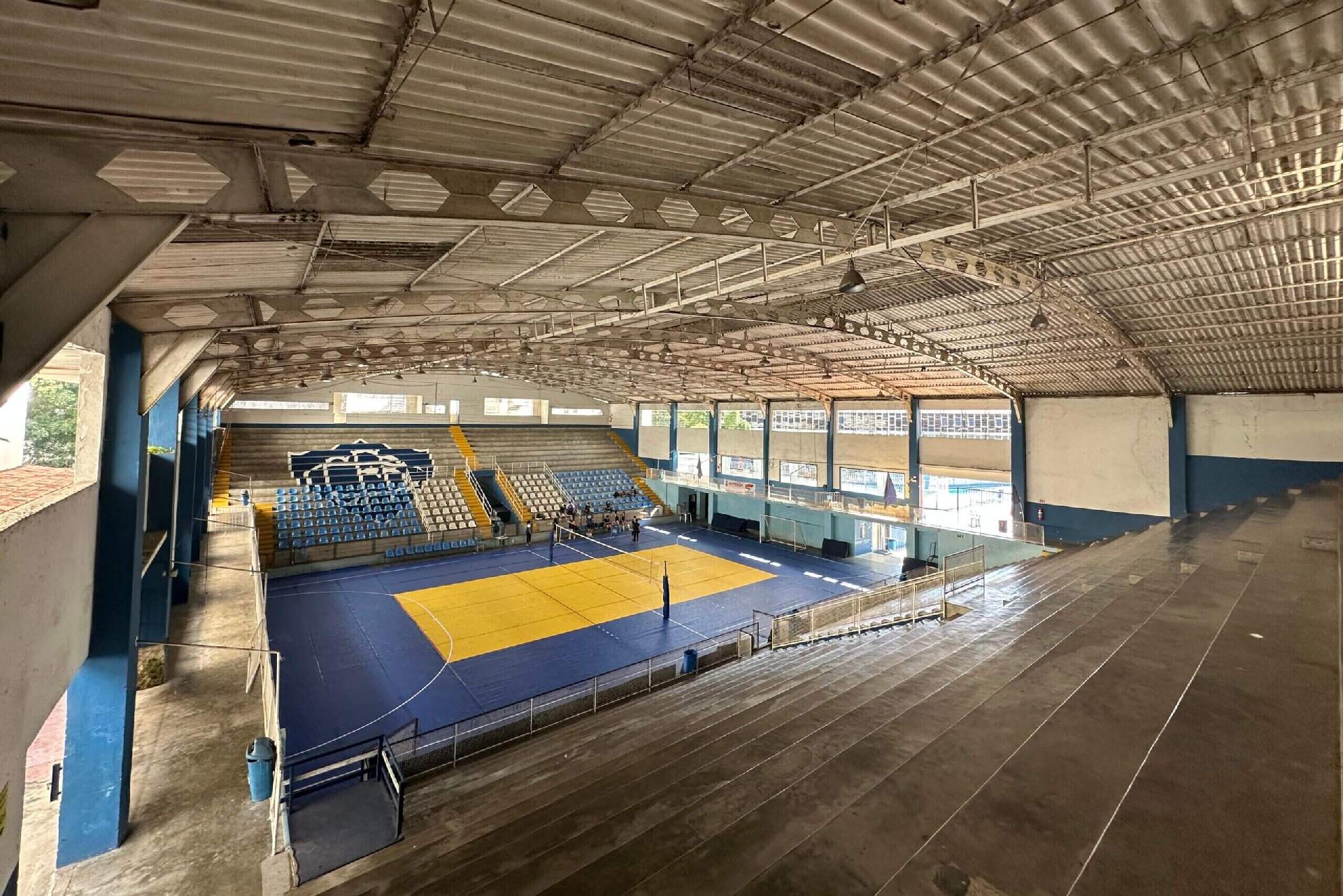
“Vinicius was a happy kid,” Siqueira says. “He would nutmeg his opponent and burst into laughter. When he scored, he celebrated with so much joy. He will never lose that smile. But he was also a fighter. He had grit.”
Siqueira sighs deeply when asked about the abuse to which Vinicius Jr has been subjected in Spain.
“I'm so upset about what is happening to him,” he says. “Man… he doesn't deserve it. Doesn't deserve it at all. Vinicius was always one of those kids who walked onto the pitch to enjoy himself. Football was fun for him. That's how it should be. Now you've got people in the stands abusing him. It's a farce.
“I feel sad that racism still exists in certain places. It's ugly stuff. Football is the people's passion, but it's ruined by these clowns.”
The night Real Madrid showed its love for Vinicius Junior and stood in solidarity with him
Still, Siqueira thinks Vinicius Jr should be proud of the strength he is demonstrating in the face of such barbarity.
“He's doing the right thing,” says Siqueira. “He waited for the right moment to set things alight. It has to end now. Full stop.”
Carlos Noval knows Vinicius Jr better than most. As the executive director of Flamengo's academy, he oversaw the youngster's progress through their youth ranks. The two still swap WhatsApp messages, and Vinicius makes a point of visiting his old mentor whenever he is back in Rio.
“The thing that always stood out with Vinicius was his sense of joy,” Noval says. “He spread happiness wherever he went. That wide grin on his face, a bit of mischief to him, always joking around. It was contagious.”
Behind the megawatt smile, though, there was an inner steel. Like so many young footballers in Brazil, Vinicius Jr knew football represented his best shot at a good life. Perhaps even his only shot.
“He always had this drive inside him,” Noval explains. “He gave everything on the pitch, knowing that football would allow him to help his family and those around him. That was in his mind even from a young age.”
A nine-year-old Vinicius Junior with Escola Flamengo's Cacau and wife Valeria (Photo: Carlos Abrantes)
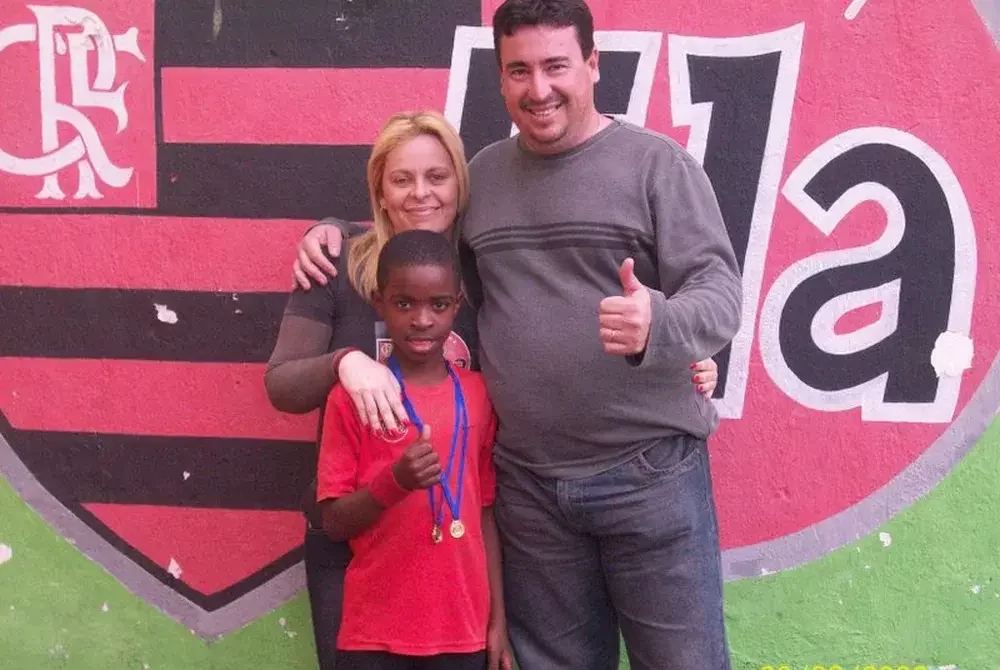
Off the pitch, too, he needed to be committed.
The drive from Mutua to Flamengo's training ground, on the other side of Rio, takes about 90 minutes if things run smoothly. But in Rio, a city of beautiful chaos, things don't usually run smoothly at all. Besides, mum Fernanda — who by this stage did all of the ferrying duties because Vinicius Sr was away working in Sao Paulo, around 200 miles (350km) to the west — did not drive.
Instead, she would accompany Vinicius on the slow bus to Gavea, about two-thirds of the way there, with her youngest son, Jose, on her lap. From there, Vinicius would go on alone; Fernanda and Jose would then hang around, waiting for four hours, until he rejoined them for the rest of the journey home again. It was an all-day kind of job.
They kept this up for months before getting together the money for a private van to take Vinicius all the way in one go. Then, at 14, he moved in with an aunt and uncle in Rio, which cut the travel time down significantly.
Racism in Spanish football: Why is it so bad? Is there now hope for real change?
“He never seemed to miss his parents, because he was so well taken care of by everyone,” says Noval. “He was just happy.”
By the time he was 17, Vinicius Jr had a €30million release clause and was being talked about as a future star. He made the cover of Spanish sports newspaper Marca before even training with Flamengo's first team. When Real Madrid struck a deal in May 2017 to sign him once he turned 18 more than a year later, he had played just 17 minutes of senior football.
It would be easy for all that — and all of the success he has enjoyed with Madrid in the years since — to go to a young footballer's head. But those close to Vinicius Jr insist that he has not lost his essence.
“From my point of view, he hasn't changed too much,” says Gilmar Popoca, who coached Vinicius at under-13, under-17 and under-20 levels at Flamengo. “Of course the money made a difference to his family, but he is still down to earth. He invites me and my family to his birthday party every year. He treats me with great warmth and respect. He has good people around him.”
Kids at the Escola Flamengo hope to one day emulate Vinicius Junior (Photo: Jack Lang/The Athletic)
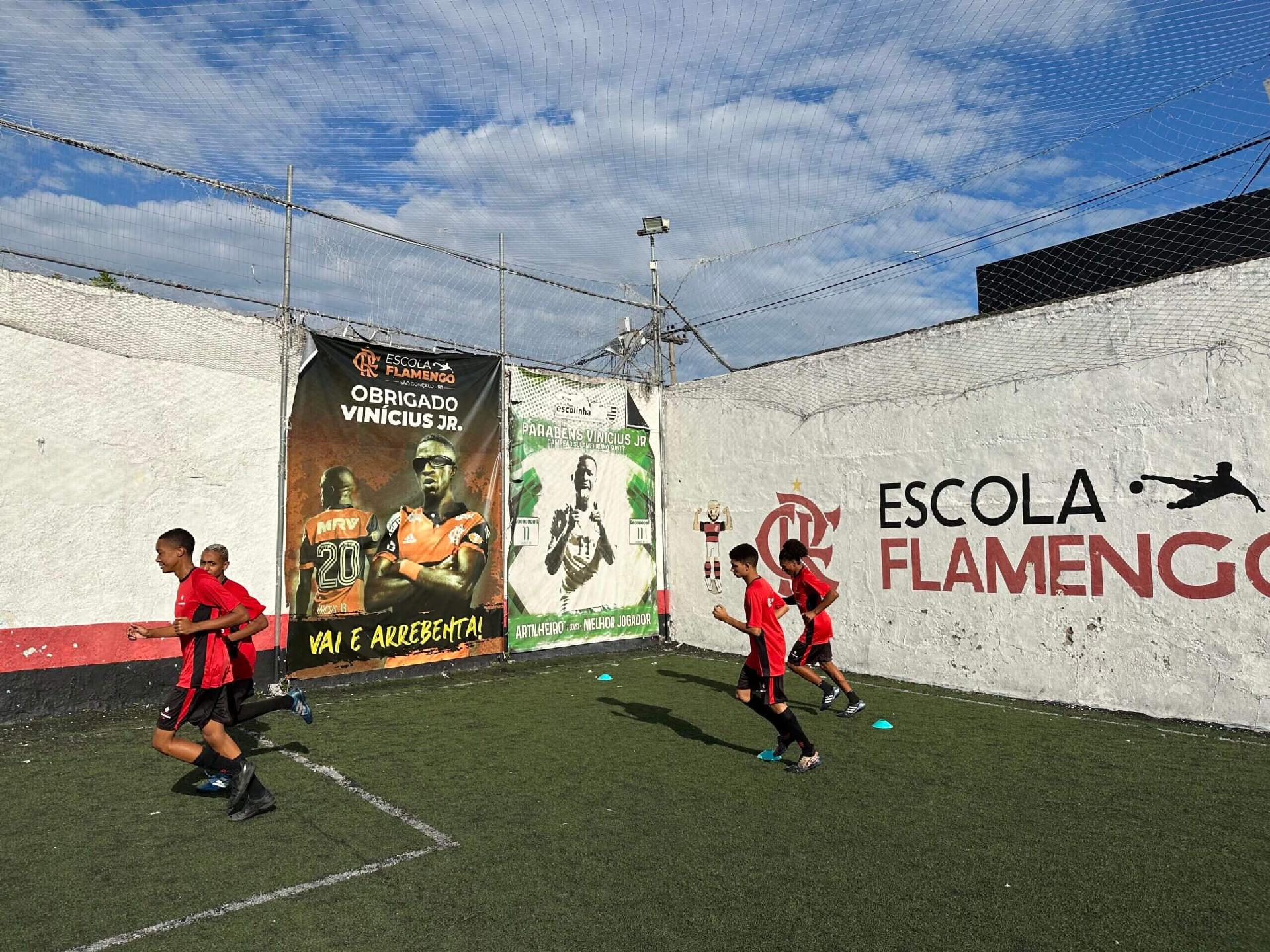
Noval echoes that view. “He was always a simple, modest kid,” he says. “Honestly, he might be one of the best people I have met in my life. I mean the human being, not the footballer. He never has a bad word to say about anyone. He always has a grin on his face, always treats everyone exactly the same, even now he is famous.”
Vinicius Jr now runs and funds a charitable institute in Rio — Instituto Vini Jr — which aims to use football and technology to promote education in local schools. He is a regular visitor to the Flamengo academy when he returns to the city. In Sao Goncalo, too, they say he always makes a point of showing up at the football school, posing for pictures and handing out old boots to the kids.
Inside Cacau's office, above a desk stacked with papers, is a framed Brazil shirt, No 11, signed by Vinicius Jr.
“Cacau,” reads a message in marker pen. “Thanks for everything.”
Vinicius Jr was always a dribbler, a natural showman. He had the footwork, sure, but he also had the personality for it, that innate desire to entertain.
“I once saw him flick the ball over the head of one defender, then another, then stop in front of goal,” recalls Siqueira. “He looked back and laughed. I don't know why exactly. Maybe he thought, 'Wow, how did I do that?', but everyone watching burst out laughing — his team-mates, the families, even the other team.”
As kids grow older, the dulling seriousness of the adult world looms into view. One minute, football is about fun and laughter, painting brilliant shapes with your body and a ball; the next it's about winning and duty and money. The pure, ludic properties of the game — it is, after all, just a game — get whittled away.
Vinicius resisted that. For Brazil's under-17s side, he once lifted the ball over the heads of three opponents in a row, just because he could. His highlights reel is overflowing with so many nutmegs and dummies that it's actually funny. “He would provoke defenders, telling them he was going to twist them inside out,” Noval told The Athletic last year, “and then he'd do it.”
A 17-year-old Vinicius Jr celebrates scoring for Flamengo in 2017 (Photo: Buda Mendes/Getty Images)
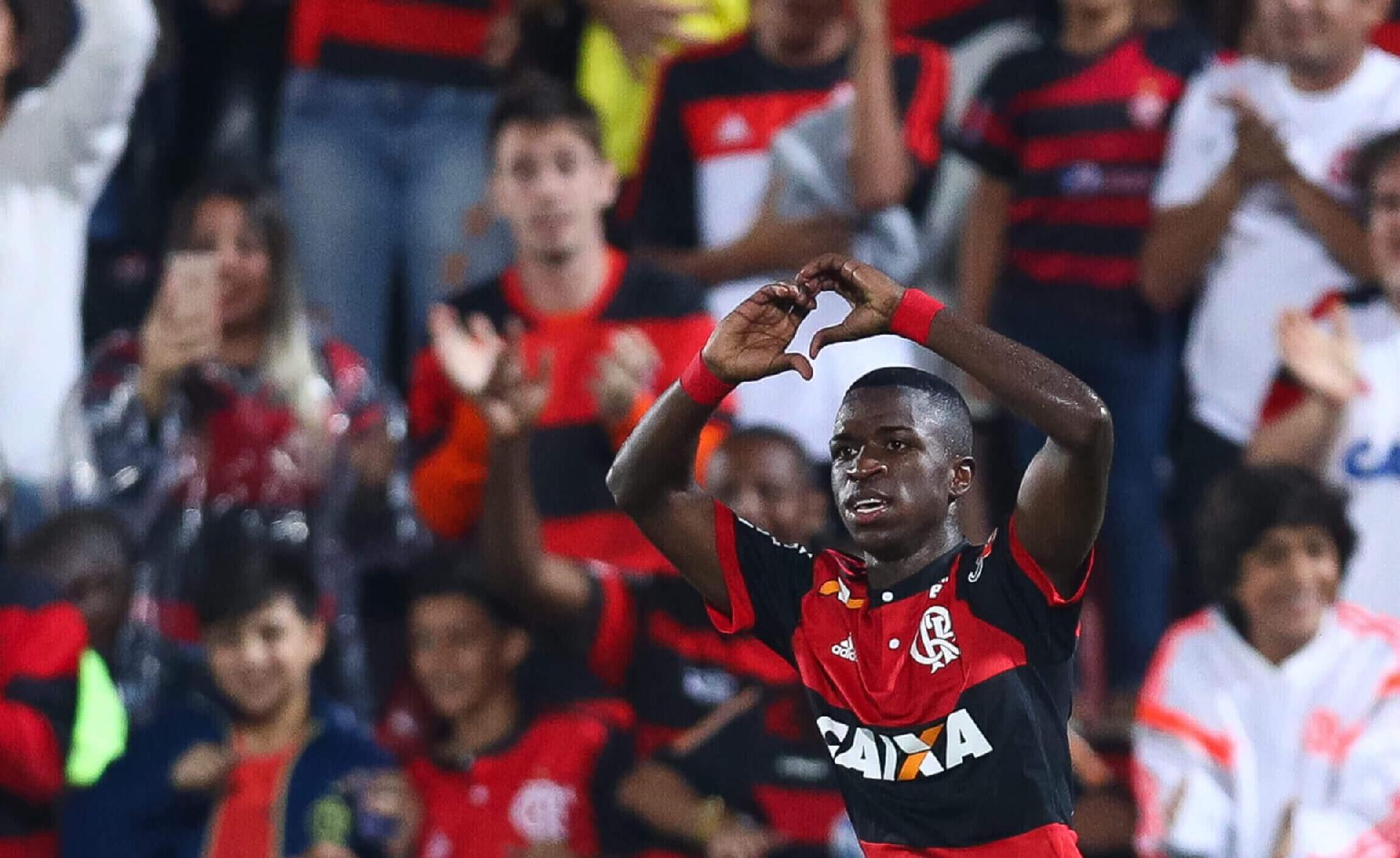
This is the other side of dribbling: it's a blood sport. Defenders hate being embarrassed. It's what makes it dangerous, a delicate balance of risk and reward. It is also what makes it so thrilling. Certain people, of course, dislike this kind of thing. Provocative, they call it, or flashy. Funnily enough, some of these moral puritans seem to dislike it most when the bullfighter concerned is young, gifted and black.
There is a video of Vinicius Jr from 2019, in which he is asked a set of quickfire questions. Watching it today, one jumps out: “Of the things that happen to you on the pitch, what do you hate the most?” His answer? “People pulling my shirt.”
The innocence of that response stands in stark contrast to the events of the last week. The worst thing Vinicius Jr could imagine happening to him while playing the game he loves back then was an act of minor cheating. Now, you sense, his answer would be rather different. It is impossible not to lament that fact.
“He probably never thought that he would go through all of this,” says Ze Ricardo, who worked with Vinicius Jr at youth level for Flamengo and gave him his senior debut for the club at age 16. “I think he is really hurting, even if he also understands the importance of what's happening.”
Now, Vinicius Jr is moving into a new phase. He is a victim, yes, but also a protagonist. The responsibility for taking a stand against racism really should not fall upon the shoulders of a 22-year-old, but he has accepted the baton with grace and eloquence. More grace and eloquence than his tormentors — and those who make excuses for them — deserve.
It feels like a transcendent moment in the sport. We must hope that it is.
“He's going to be a role model around the world,” Noval says. “He's doing the right thing, which is to fight. Vinicius is raising a flag for everyone.”
Vinicius Jr made his Flamengo debut at the age of 16 (Photo: Buda Mendes/Getty Images)
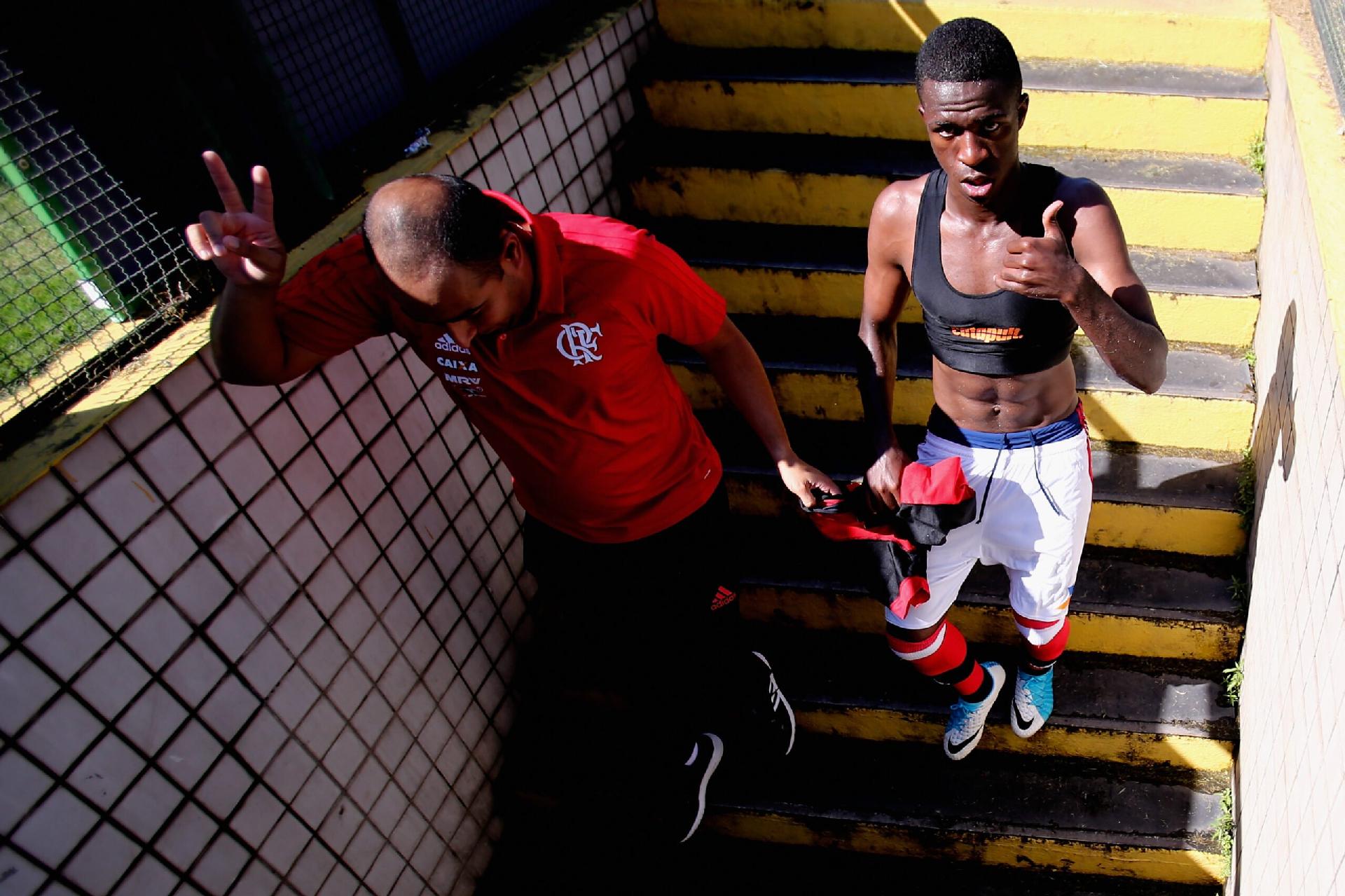
Vinicius Jr is lucky that he has a good support network around him. He remains close with his family — his mother and youngest brother live with him in Madrid — and his 10-person staff in the Spanish capital includes his long-time agent and a communications manager.
They will no doubt have helped him shape the message this week. Those who know Vinicius Jr, though, are certain that he is the driving force behind it. He, after all, is the one being called a monkey. How could it not be personal?
“It comes from him, from within,” says Noval. “You can be sure of that. This is something that has really affected him. I think he has a real desire to change things, once and for all. He knows that he has the strength and the support to make a difference.”
Ze Ricardo agrees. “Beyond the pain of the situation, I think he will end up changing the sport for the better,” he concludes. “We always knew he had talent as a footballer, but now he is using his position intelligently.
“I think that he knows what he is doing. He says he won't stop dancing, because he's representing a lot of people, not just himself. I think he can handle it all.
“Even in these circumstances, his star is shining.”
- 消息参考来源: SN_SPIDER_MANUAL
- 严禁商业机构或公司转载,违者必究;球迷转载请注明来源“懂球帝”
- 懂球帝社区规范:抵制辱骂

